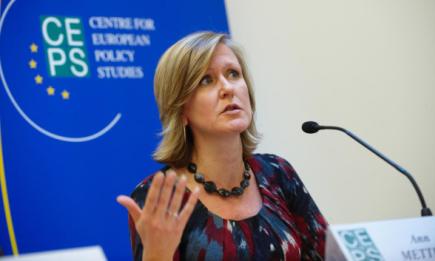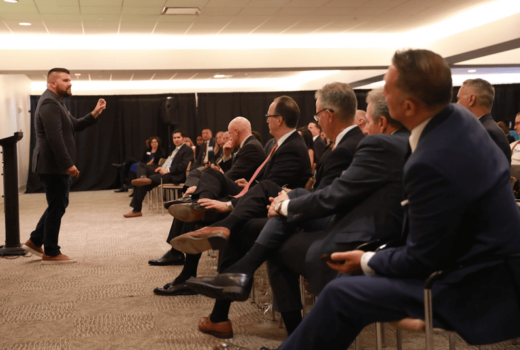Moment of Truth

It has escaped me, frankly, why Angela Merkel has been portrayedas a bad European as of late. Perhaps because she didn’timmediately cave in to calls for a Greek bail-out? Or is it becauseshe didn’t want to follow Europe’s lagging economies by replicatingtheir model of exporting less – because of lack of demand for theirproducts- , consuming more, and raising wages irrespective ofproductivity increases?
I have often wondered what this day would be like, the springEuropean Council 2010, when leaders would kick-start the EU’s next10-year strategy. My feeling today is a strange mixture of cautiousoptimism and mild disappointment. The optimism is driven by whathappened last night at the European Council. Despite all theirdifferences, the Eurozone leaders decided on a set of conditionsthat are uncomfortable enough to prod countries into finally doingthe structural reforms that they’ve only been talking about in pastyears. Who will want to invite the IMF into their countries,risking the loss of economic sovereignty and making themselvessubject to diligent surveillance and public humiliation?
Finally, the Stability and Growth Pact has some teeth again. Andfor all those that criticize the Germans for being so tough andfiscally responsible, think back only five years ago when at thisvery spring European Council the Germans led an effort – underthen-Chancellor Gerhard Schröder – to make the Stability and GrowthPact more “flexible”. Only five years ago Germany was widelyconsidered the sick man of Europe, faced with over five millionunemployed, anaemic growth and loss of competitiveness. Anyone whocriticises Germany now should look back to 2005 when it wasdownright embarrassing to be German.
Needless to say that the additional “flexibility” in the Stabilityand Growth Pact led to so many of the fiscal problems that we seetoday. For all those countries that didn’t use the growththey experienced in the last decade – including Greece and Spain -one can really have only one message: you can’t reform during thegood times. Guess what? You’ll have to reform during the badtimes.
My prediction is: the deal the EU leaders brokered last night onthe conditions of a bailout for Greece will do more to driveforward structural reform that than the official European processdesigned for modernising our economy, the Europe 2020strategy.
Which brings me to my second point, namely my disappointment. Itincreasingly seems that our leaders are driven by events, ratherthan driving events themselves. What I mean is that this is alreadythe second summit that they were supposed to talk about Europe 2020but were this agenda topic has been sidelines by short-term crisismanagement to tackle the Greek crisis.
With EU leaders coming together twice in less than six weeks, notto lay the foundation for the next decade, a solid blueprint forfuture economic growth and job creation, but rather to tackle theproblems of a country staring at the fiscal abyss, tells useverything we need to know.
We have reached a point where our problems are so overwhelming andour political room to maneuver is so small, that virtually no onehas time any more to reflect on what kind of economy we want tobuild and leave behind for our children and future generations.Issues that are of fundamental importance, such as education,innovation and fighting climate change, get drowned out in thealmost hysterical quest for short-term remedies to cover upunderlying problems. We no longer go after the disease but rathertry to take a short-term medicine to kill the pain or cover up thesymptoms.
Europe 2020 was supposed to address many of the these issues butapart from being drowned out amidst the crisis management forGreece, it is also subject to widespread (and frankly surprising)criticism from European leaders. Most of the targets are nowdisputed by one member state of the other.
The 3%R&D target is questioned by finance ministers, who arelooking for possible cuts in their national budgets. The 40% targeton tertiary graduates is disputed by Germany, where the federalgovernment has given up jurisdiction for education to its regions.The shifting of financial resources within the structural andcohesion funds is countered by Poland and Italy which do not wantto see the emphasis on big infrastructure projects replaced by moreinvestment in skills, innovation and entrepreneurship. And anyeffort to link the EU budget to its purported political prioritiesof generating “smart, sustainable and inclusive growth” will fallfoul of France, which insists that the lion’s share will continueto go to agricultural subsidies.
For all the talk about “economic government” or “governance”,Euroskeptics in the UK or elsewhere need not worry for our leadersare as far from reaching consensus as they could possibly be. Theonly thing that unites Europe right now is a widespread feeling ofurgency in the face of the global economic crisis, of wanting tofight increasing international marginalisation – asexperienced at the Copenhagen climate talks and the cancellation ofthe EU-US summit by President Obama – and of knowing that whatis at stake is nothing less than the European way of life, in thewords of Council President Herman van Rompuy.
But what divides us are fundamentally different ideas over economicmanagement and priorities and future challenges and the adequateresponses. The next three months will be crucial because the JuneEuropean Council will have to produce a powerful, visionary andcompelling blueprint for the future.
With the Greek crisis ostensibly dealt with, our leaders have nomore excuses to favour the short-term over the long-term; to engagein immediate crisis management rather than laying the foundationsfor future prosperity; for constantly reneging from theirresponsibilities for future generations rather than satisfying thedemands of today’s vested interests. The moment of truth has come.And it will decide not only the fate of the Euro but the fate ofEurope.
Meest Gelezen
Vrouwen houden universiteit draaiende, maar krijgen daarvoor geen waardering
Hbo-docent wil wel rolmodel zijn, maar niet eigen moreel kompas opdringen
‘Sluijsmans et al. slaan de plank volledig mis’
Wederom intimidatie van journalisten door universiteit, nu in Delft
‘Free riding brengt het hoger onderwijs in de problemen’



